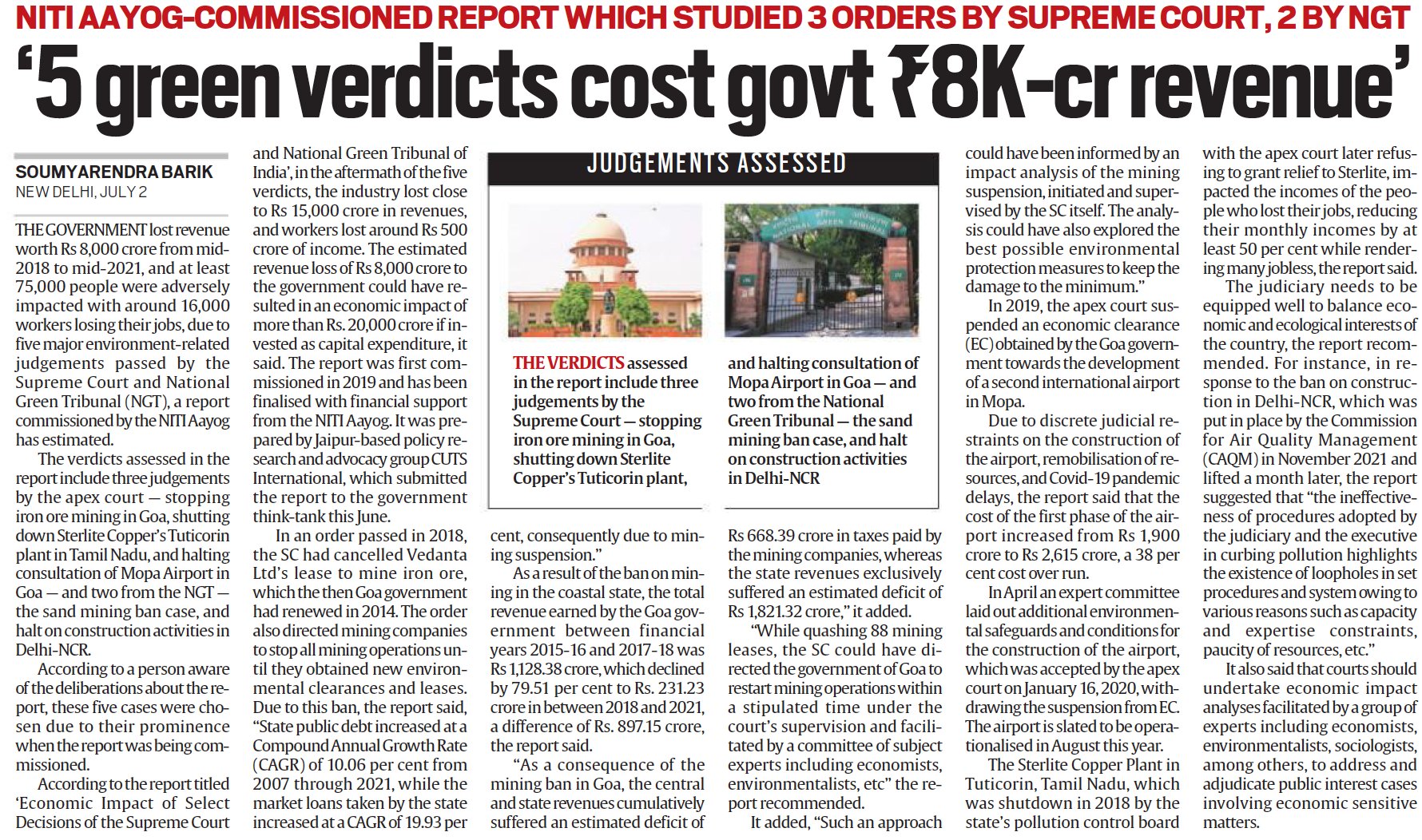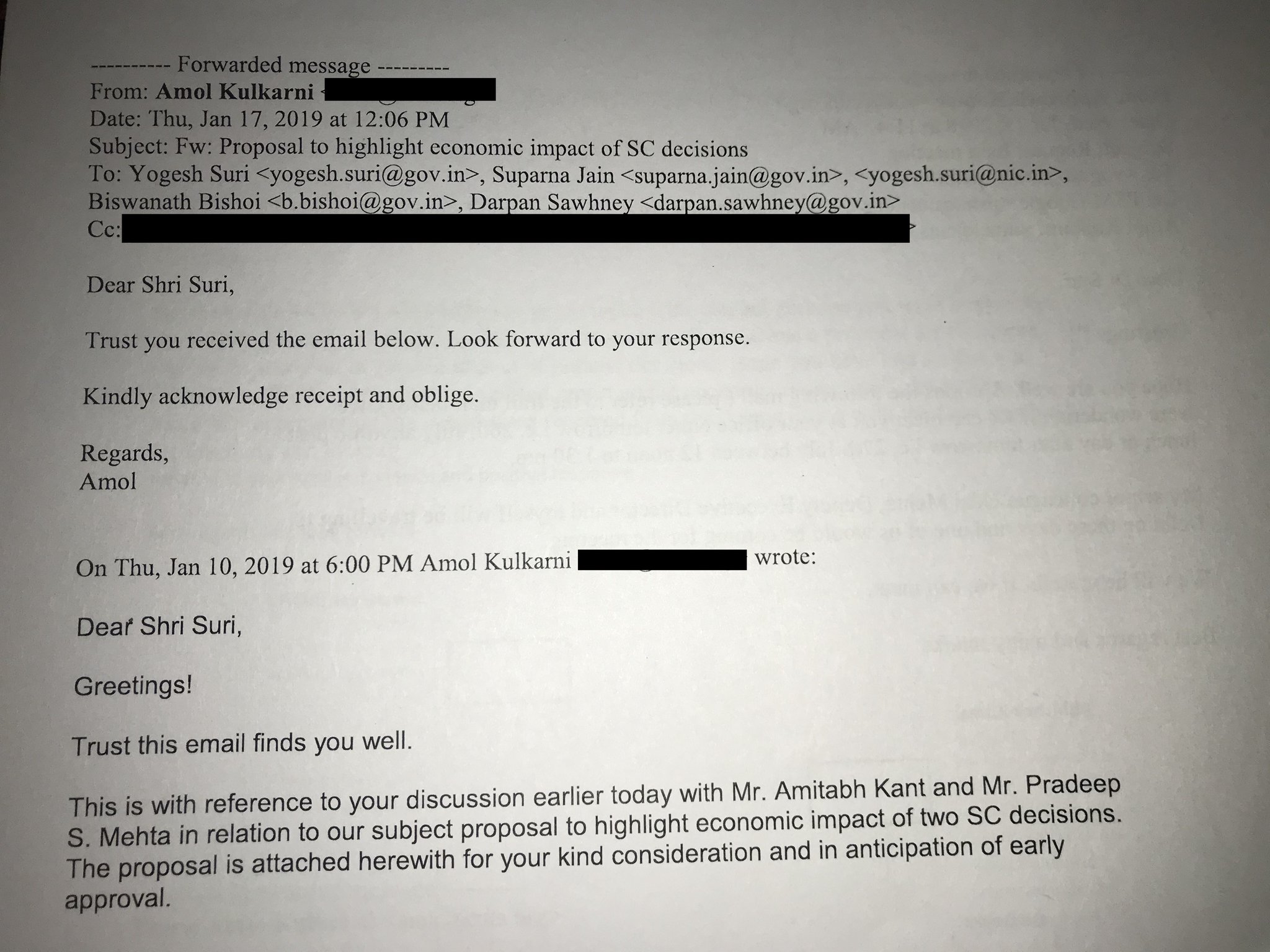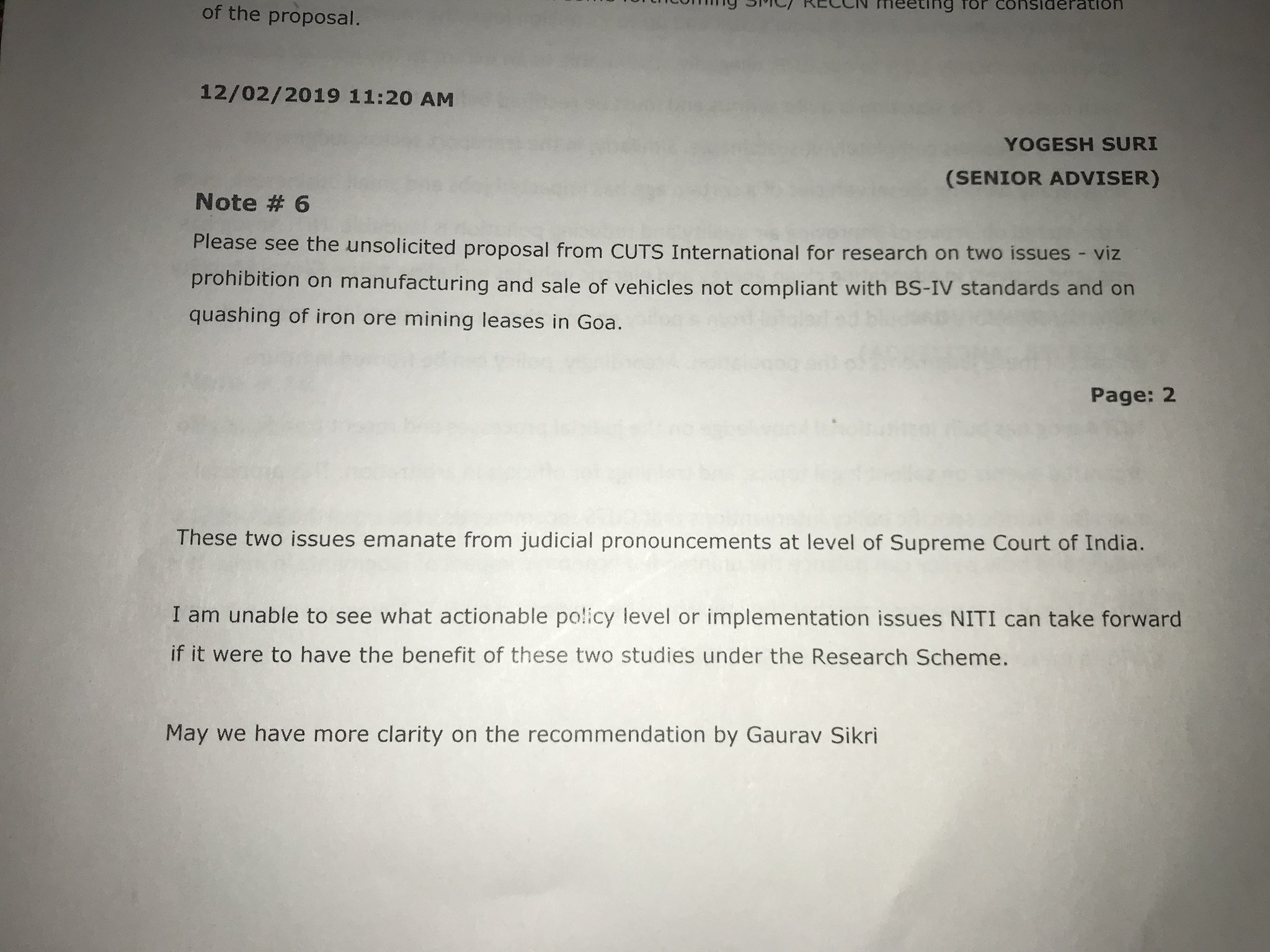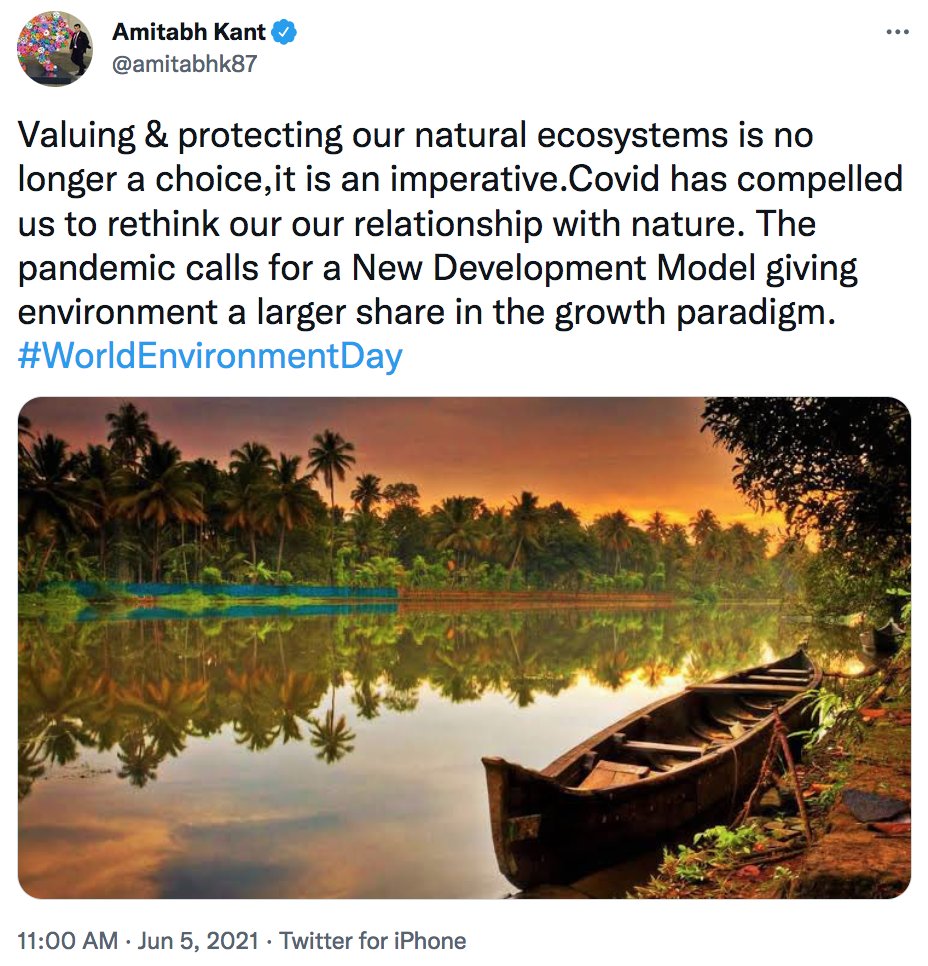Thread by Shreegireesh Jalihal
Thread
#Thread: Environment, Courts and the Modi government
On Sunday a news outlet put out a prominent six-column news article.
On a report Niti Aayog commissioned. This report indirectly takes a pot shot at the judiciary for the rare occasions it stands up for environmental law.
On Sunday a news outlet put out a prominent six-column news article.
On a report Niti Aayog commissioned. This report indirectly takes a pot shot at the judiciary for the rare occasions it stands up for environmental law.
Now let me tell you the real story: How Niti Aayog cherry-picked cases to blame Supreme Court for 'judicial activism'. Based on personal opinions of the Aayog's then CEO.
And, how the entire study was a sham.
And, how the entire study was a sham.
So what did the report claim: Five pro-environment verdicts cost the government over Rs 8,000 crore in revenue from 2018-21. It says over 16,000 workers lost their jobs. All because of 5 green verdicts -- 3 by the SC and 2 by the National Green tribunal.
The @reporters_co dug out the papers showing what went on behind-the-scenes in the run up to this report. The records also tore to bits lies the Aayog put out through 'unnamed sources'. The documents also showed how personal opinions seeped into the making of the report.
@reporters_co The story begins on 10 January 2019.
Pradeep Mehta, secretary-general of CUTS International, a Jaipur-based NGO working on 'consumer sovereignty', met Aayog's then CEO Amitabh Kant. They discussed economic impacts of SC judgements. A proposal to study these impacts was floated.
Pradeep Mehta, secretary-general of CUTS International, a Jaipur-based NGO working on 'consumer sovereignty', met Aayog's then CEO Amitabh Kant. They discussed economic impacts of SC judgements. A proposal to study these impacts was floated.
@reporters_co The original proposal was related to two SC decisions. One was about the manufacture and sale of vehicles that did not meet Bharat Stage-IV emission standards. This had wide implications for public health because of air pollution. The other was a verdict on illegal mining in Goa.
@reporters_co The thrust, from the beginning, was to highlight how these pro-environment verdicts harmed business interests and were bad for investments.
@reporters_co Anyway, back to 2019.
CUTS International’s unsolicited proposal to study two Supreme Court judgements moved up the bureaucratic ladder but hit a hurdle in February 2019. The second- highest-ranking bureaucrat at Aayog asked a logical question: what's the point of this study?
CUTS International’s unsolicited proposal to study two Supreme Court judgements moved up the bureaucratic ladder but hit a hurdle in February 2019. The second- highest-ranking bureaucrat at Aayog asked a logical question: what's the point of this study?
@reporters_co “I am unable to see what actionable policy or implementation issues NITI can take forward if it were to have the benefit of these two studies under the research scheme,” wrote Yaduvendra Mathur, additional secretary at the Aayog.
@reporters_co Mathur asked for the views of Niti Aayog consultant Desh Gaurav Sekhri, a sports lawyer who was appointed from the private sector in 2017. Sekhri was the first official on record to back the study.
@reporters_co Sekhri said orders on illegal mining had “potential to restrict the Indian economy significantly while at the same time possibly deterring investment...the situation is quite serious and must be rectified before the cost to the Indian economy becomes completely unsustainable”.
@reporters_co Convinced, Kant cleared the file. It was now with Aayog's in-house research committee. This group includes, among others, Kant himself.
A month later, the SC delivered a new judgement. One that enraged Kant. So much that he would soon break a sacred bureaucratic covenant.
A month later, the SC delivered a new judgement. One that enraged Kant. So much that he would soon break a sacred bureaucratic covenant.
@reporters_co On 29 March 2019 the Supreme Court ruled that Goa’s second airport was illegally granted environmental clearance. The airport is being constructed, in Mopa, by GMR Goa International Airport Limited in a joint venture with the state government.
@reporters_co The SC pointed to “patent and abject failure” on the part of Goa govt in disclosing facts and “serious flaws in the decision-making process” of the Centre that cleared the project by “excluding relevant materials”. SC called for a review of the clearances granted to the project.
@reporters_co Soon, Kant, in an unprecedented move for a bureaucrat, wrote a column criticising the SC judgment on Mopa. He concluded the judgment would come at a significant cost for doing business and rued 'interventions by the judiciary after statutory approvals'.economictimes.indiatimes.com/blogs/et-commentary/the-need-to-mope-about-mopa/
@reporters_co The judgment, unlike what Kant wrote, was not about govt policy. It was instead a judicial review of an environmental clearance granted in violation of green laws. While Kant focused on business interests, the Supreme Court judgement dealt with violations of environmental law.
@reporters_co @nit_set summarised Kant's article the best: "Kant got some facts of the case and the judgement wrong. He missed acknowledging several other vital ones."
www.business-standard.com/article/economy-policy/can-a-serving-bureaucrat-criticise-judgement-of-the-... www.business-standard.com/article/economy-policy/can-a-serving-bureaucrat-criticise-judgement-of-the-...
www.business-standard.com/article/economy-policy/can-a-serving-bureaucrat-criticise-judgement-of-the-... www.business-standard.com/article/economy-policy/can-a-serving-bureaucrat-criticise-judgement-of-the-...
@reporters_co @nit_set In response to the article by my colleague @nit_set, Kant claimed his column only reflected his personal views. With this, he had absolved Niti Aayog of criticising the judiciary.
Soon, these “personal views” seeped into the research commissioned by the Aayog.
Soon, these “personal views” seeped into the research commissioned by the Aayog.
@reporters_co @nit_set In a meeting to discuss the NGO's proposal, according to the files, Kant said: “There are many judgements of the National Green Tribunal also that need to be analysed in terms of their economic impact.”
Niti Aayog decided that the NGO would suggest more cases for the study.
Niti Aayog decided that the NGO would suggest more cases for the study.
@reporters_co @nit_set A revised list was soon chalked up. It was based on "public perception of excessive judicial activism'. The list now included the Mopa judgement, which was Kant’s personal irritant.
@reporters_co @nit_set The records do not show how the Aayog or the NGO decided if anyone in the public besides Kant viewed the Mopa judgement, or any other judgement for that matter, as a fit case of “excessive judicial activism”.
@reporters_co @nit_set More than a year later, on February 2021, CUTS put out a brief on the draft report on its website. It said the expected outcome of the study was “initiation of a building of a narrative supporting better sensitivity of economic impacts of judgements by the judiciary.”
@reporters_co @nit_set It also said that the report will "serve as useful training inputs for the training of judicial officers.”
@reporters_co @nit_set In response to the backlash on this brief, unnamed Aayog officials claimed the study was never about judicial activism to begin with. This was a lie. Records @reporters_co showed how 'excessive judicial activism' was the criteria for selecting cases from the beginning.
@reporters_co @nit_set Kant, by the way, believes environment should have a 'larger share in the growth paradigm'. :)
@reporters_co @nit_set You can read our report, published by @Article14live here: article-14.com/post/govt-think-tank-hand-picked-sc-rulings-to-probe-judicial-activism
@reporters_co @nit_set @Article14live Reportage like this, based on a careful reading of govt files obtained through persistent RTI queries takes time and effort. But it's useful in nailing official lies and exposing their true intent. To support journalism of this kind, support @reporters_co: www.reporters-collective.in/support-us
Mentions
See All
Gautam Bhatia @gautambhatia88
·
Jul 5, 2022
Great thread.






